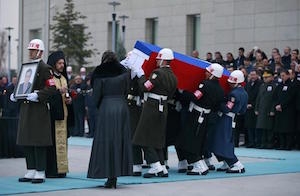Turkey Won't Allow Attack to Derail Efforts for Peace and Stability

Emrah Gurel/AP
Furthermore, the terrorist attack will in no way derail our efforts to work with Russia and other parties to end the conflict in Syria. Not only will finding a solution to the bloodshed ease the suffering of the millions who have been forced to flee and of those who remain trapped amid the fighting; it will also prevent terrorists from exploiting chaos in the region to justify cowardly acts such as the world witnessed Monday.
Because of its location and influence, Turkey is the key to any political settlement and remains at the center of humanitarian relief. Since 2011, Turkey has accepted three million refugees displaced by the civil war in Syria and the atrocities of ISIS and Syria and Iraq. Turkey offers the refugees free health care and their children tuition-free elementary, secondary, and even university education, all at a cost to Turkey of more than $12 billion and counting.
Helping our neighbors comes naturally and is also in our own and our allies’ interest. Take educating refugee children. Without proper schooling and structure, these displaced youngsters mark an easy target for extremists, and we have seen all too often the result of radicalization. This year alone, Turkey enrolled nearly 500,000 refugee children, 150,000 more than in 2015.
Turkey spends billions of dollars and dedicates tremendous resources for the 260,000 refugees in government-run centers. Equally important is the generosity and activism of nongovernmental organizations that work with the Turkish government and citizens to provide essential services to the additional 2.7 million Syrians and other displaced people who have found shelter in Turkey’s cities and countryside.
One such group is the Syrian-American Karam Foundation, whose chairman is Boston orthodontist Dr. Omar Salem. Karam Foundation volunteers visit Turkey regularly and, since 2011, have helped more than 100,000 refugees. Dr. Salem personally has traveled to Turkey seven times, most recently in July, and has treated 3,000 people for dental care.
Dr. Salem says that most of the refugees he’s encountered in Turkey, while they appreciate the security and help Turkey provides, long for the day when they can return to their country. “These displaced people are not the problem,” he told me. “They are the victims of the problem.”
Some cities and towns near the Syrian border, such as Reyhanli, have doubled in size as refugees pour in to live among the native-born population, something Dr. Salem has seen first-hand.
Helping those uprooted by war and persecution is nothing new for Turkey and in fact is part of our national character. In 1878, for example, Ulysses S. Grant, a year removed from the presidency, traveled to Istanbul as part of a world tour. There he saw the city housing, feeding, and caring for refugees, mostly Bulgarian Jews, who had fled fighting in the Balkans.
“They are fed entirely by charity and mostly by foreigners,” Grant wrote in a letter to the US consul general in Paris.
Now as then, as Monday’s cowardly attack makes even clearer, Turkey is the first line of defense against the ravages of terrorism and war in the Middle East, a haven for those displaced by it, and the linchpin for stability in the region.
OMUR BUDAK is consul general of Turkey in Boston.
(Source: Boston Globe)
Last modified onSaturday, 06 May 2017 10:07
Latest from Admin TOA
- Calculatit.net Is Bringing Pricing Transparency to America’s Construction Industry
- Support Independent, Trustworthy Journalism
- Fat Sal’s Italian Specialties Welcomes Customers in Bayville, NJ with a Renewed Concept
- FFD Wood LLC Delivers Custom Woodwork Solutions from Long Island
- A Tax Expert in the U.S. Tax World: An Interview with Samet Oynamıs








